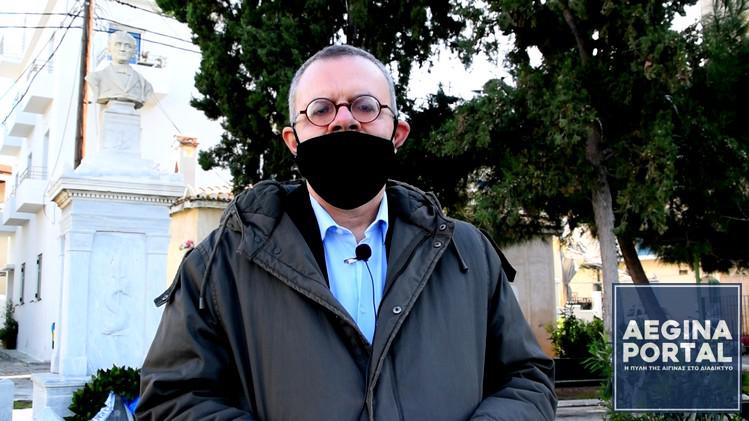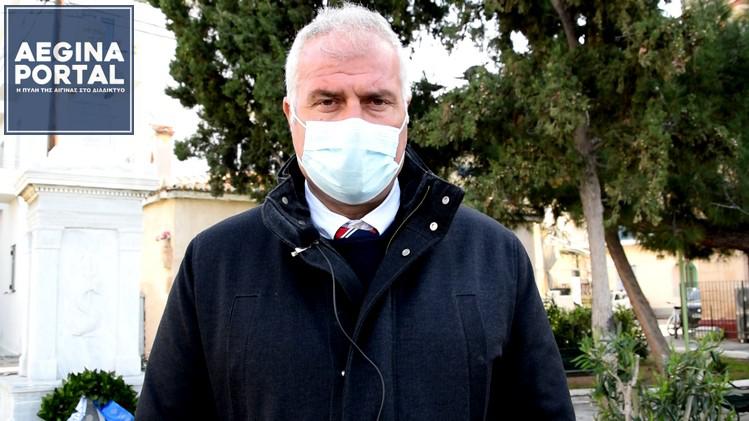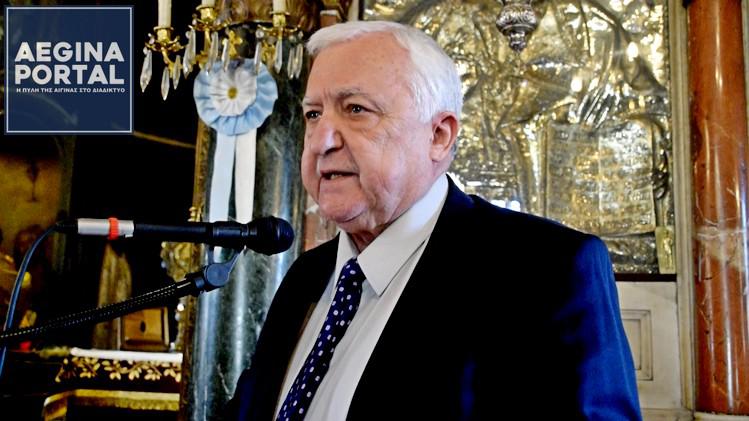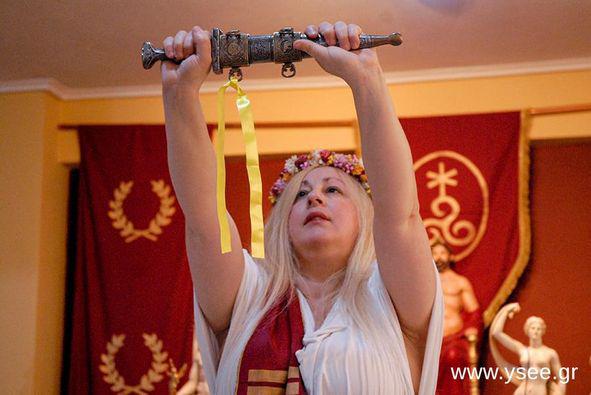The president of the 2021 Committee of the Municipality of Aegina, Mr. Manolis Kottakis, speaking today to Aegina Portal, offered a first assessment of the work and activity of the committee. He also mentioned what the committee is programming for the coming
period.
https://www.aeginaportal.gr/aftodioikisi/epitropes/29687-o-manolis-kottakis-kanei-ena-proto-apologismo-tis-epitropis-2021-tou-dimou-aiginas-kai-parousiazei-ton-programmatismo-tis-epomenis-periodou.html

On the occasion of the celebration of the arrival and swearing-in of Ioannis Capodistrias on our island, I want to give a briefing on what the Municipality of Aegina and the local committee for 2021 has done up to now, and what we are planning, bearing in mind that everything remains unsettled because of developments with the pandemic.
“The Phoenix” on the numismatic programme of the 2021 National Committee.
The committee started work in July 2020 and between then and now we have succeeded in having the “Phoenix”, the Greek State’s first coin included on the official numismatic programme of the 2021 National Committee. In this way our island attracted publicity through the “Phoenix” also, in all of Greece.
The Capodistrian buildings on the television channel of the Parliament
We also managed through the television channel of the Parliament to have an exceptional programme screened with participation from Mrs. Theologidiou, father Emmanuel Giannoulis and Giorgos Bitros, with references to the Capodistrian buildings, and the buildings were presented, for the first time, with the use of drones. The projected scenes are impressive. Anyone who has not seen the programme can find it on the Parliament site and you will see that our Aegina has made an impression there too and finds itself the centre of attention.
The Committee’s official website now functioning
We can also announce that in this period the Committee’s official site Aegina First Capital came online, respecting public money because the site operates with a grant from Alpha Bank following a decision by its president Mr. Vassilis Rapanos, whom we now thank, and with the consequence that with the functioning of the site there has been a dramatic increase in visits to the Aegina First Capital link.
The ramp at the Governor’s House and the exhibition in the Hellenic Parliament
A few days ago also (said on 24th January 2021) work was completed on the Governor’s House (the first “Maximou”), to which the exhibition in the Hellenic Parliament is to be transferred. Archaeological finds were uncovered during excavation and the ramp constructed by the Education Ministry to make the Governor’s House visitable, is ready. A public thank you for their intervention on this issue to the director of the Prime Minister’s office Grigoris Dimitriadis and to the Minister of Education Niki Kerameos, and indeed to the Minister’s advisor Mrs. Despina Mavri. They showed tangible interest in seeing this particular work completed. It is small but decisive for the reopening and renewed functioning of the Governor’s House.
Two book publications with important information
I must tell you that so far, and with this I conclude the first tentative assessment of our committee and its work, two publications which place Aegina at the centre of their inquiry have been circulated with the support of the committee. The first is the book of the Archbishop of Athens Ieronymos on the subject of Church property. It includes a rare document, a decision from among the first signed by Capodistrias here in Aegina, where it shows that the Ministry of Education and Religion were amalgamated and from that time it was decided that they would go together. This was in Aegina in 1828. It also emerges from the Archbishop’s book, which His Grace was so kind as to send to me, that the Holy Synod was convened in hybrid form for the first time in Aegina. So Aegina was not only Greece’s first capital but it was here in fact that the Holy Synod, and the Church of Greece, were founded.
Programming in the coming unsettled period
It is now time to say a few words about programming, always of course taking into account the unsettled situation because of the pandemic. Owing to the restrictive measures we did not manage, unfortunately, to have the time of the arrival of Capodistrias, 24th, 25th, 26th January, these three days, to be three days of commemorative celebrations which would promote Aegina throughout Greece. But you saw that today in the panegryic of the day the former minister Alekos Papadopoulos also testified in his address that Aegina was Greece’s first capital and we thank him for that public acknowledgement.
The programming, which as always is tentative, because of developments with the pandemic, provides that now, since the ramp to the Governor’s House has been constructed, the exhibition from the Hellenic Parliament will be transferred here, and we anticipate that it will be in operation in March, with the expectation that we will combine its inauguration with celebration of our national day on 25th March, conditions permitting.
Ready for printing the “Aegina of Capodistrias” album. The preface was written by the President of the Parliament Constantinos Tasoulas
I would also like to announce that the album entitled “The Aegina of Capodistria” is also ready for release. It was edited by the journalist Giannis Provis, with writers Pronoi Theologidou and our fellow citizen Dionysis Kalamakis. A few days ago we received the preface to the album, which the president of the Hellenic Parliament Mr. Constantine Tasoulas did us the honour of writing. The Parliament in fact has undertaken to print the album in 3,000 copies to make available in print the history of Aegina, the arrival of Capodistrias on our island and his contribution here, with confirmation of the documented fact that it is here that the founding acts of the Modern Greek State were brought to fruition.
The pageant of the arrival of Ioannis Capodistrias in Aegina
In May, if all goes well, the pageant that we had begun to prepare for performance today, the pageant to celebrate the arrival of Ioannis Capodistrias, will be staged in May. We will be in a position to give further details in the near future. We also have in preparation a major concert to be held at the temple of Aphaia, a surprise concert to be given by a very great Greek composer. I am not permitted to reveal his name, but the concert is programmed. And the functions of celebration, all being well, with everyone’s assistance, will close in September with the results of the student competition on the work of Ioannis Capodistrias.
That is the overview. We are struggling in very difficult conditions to organize the celebration. I think that my experience to date indicates from the functioning of the committee, to whose members I extend my thanks, and of course to the mayor of Aegina and the municipal council, that all these functions of celebration must continue after 2021. The history does not finish in 1821. We must continue into these coming years.
Manolis Kottakis

https://www.aeginaportal.gr/eidiseis/kathimerina/29686-giannis-zormpas-apodedeigmena-eimaste-i-proti-proteyousa-tou-neou-ellinikoy-kratous-i-dilosi-tou-dimarxou-gia-ton-eortasmo-tis-afiksis-kai-tis-orkomosias-tou-ioanni-kapodistria.html
Giannis Zorbas: “It is a fact that we are the first capital of the modern Greek state.” The mayor’s statement on the celebration of the arrival and swearing in of Ioannis Capodistrias
“It is a fact that we are the first capital of the modern Greek state” declared the mayor of Aegina Giannis Zorbas after laying the wreath this morning at the Ioannis Capodistrias monument next to the Panagitsa church. And he expressed the hope that next year the celebrations will be able to take place normally.
“Today we welcomed the former minister Mr. Alekos Papadopoulos, celebrated the mass in our cathedral and a small detachment came here to pay tribute and lay a wreath for the first governor of this country, whose swearing in on 26th January 1828 we celebrate today. Here in Aegina it is historically proven that we are the first capital of the newly formed Greek state. I wish you a good Sunday and from the bottom of my heart hope that next year we will be able to celebrate this event with cultural activities. This event of the swearing in, and that we will once again be living normally” said Mr. Zorbas.
Commemorative speech from the former minister Alexandros Papadopoulos

https://www.aeginaportal.gr/eidiseis/omilies/29684-o-panigyrikos-logos-tis-imeras-apo-ton-proin-ypourgo-aleksandro-papadopoulo-2.html
The commemorative speech of the day was delivered in the Aegina Cathedral at the end of the mass by the former minister Alexandros Papadopoulos. Alexandros Papadopoulos was welcomed on behalf of the Municipality of Aegina, the 2021 Committee of the Municipality of Aegina and Ioannis Capodistrias Cities’ Network by Mr. Manolis Kottakis.
The text of the commemorative speech
Ladies and gentelmen,
Much has been written about the life and the great contribution of Ioannis Capodistrias to our nation. I do not intend to repeat today what has been said at times about the martyred governor, and particularly here on our island, from where there began the creation ex nihilo of our newly formed state. You Aeginetans have honoured him, and honour him more than, perhaps, anywhere else in the country. You have been identified with his memory, not only because he made Aegina staging post for the new state, choosing it as the first capital, but above all because the assiduity and the intellectual ardour of the governor liberated from within immense spiritual forces with the power to transform a rude and ruined land into a modern country and instill its exhausted people with the psychic and spiritual strength to stand on its feet, mobilize new energies, find new hope. This echo, this muffled murmur coming from the depth of two centuries is something one feels, distinctly still, as one’s ancestors felt it even more, seeing a man struggling every day almost alone, and achieving so much in the short time he was allowed to live. They trusted this hermit politician and stood by him, this political saint so devoted to his country. The truth is that the death of the governor was followed by a void and the makeshift Greek state he left behind was destined to evolve into a post-Ottoman entity that has been struggling for two centuries to find its national character between East and West.
The period after his assassination and what directly followed led our great historian Constantine Paparrigopoulos, in total disillusion, to say “Unfortunately the new Greek state killed the Greek nation.” Because he saw its spiritual powers being drained. They were what had kept our people on their feet through four hundred years of subjugation.
The lack of inclination and belief in the creation of a new state worthy of trust with roots in institutions and rules, was something obvious. Paparrigopoulos saw the Greek people trailing behind their leaders as “the armies of defeat” to cite the phrase used later by K. Karyotakis. He watched as every attempt launched by the Governor to construct firm foundations for education, justice, social welfare, the army, a fiscal and monetary system and, above all, a sense of national dignity collapsed to the point of disappearance.
It is true that although the country has progressed significantly since then and progress has continued to the present day, it is still going forward only to go back again, with roughneck politicians, fruitless antagonisms, with demagogues,with misleaders. A society without hierarchies, with great cultural and social deficits, with a lack of the necessary common rules, which people obey not out of fear of punishment but out of a sense of self-discipline and the collective good that is characteristic of integrated societies.
Unfortunately this catastrophic desertion of the spirit and the work of Ioannis Capodistrias and subsequent dismantling of everything he managed to build in this spirit leads us to the definite conclusion that this was the reason that modern Greece was never culturally completed. It was not socially completed.
The collective vision is something Ioannis Capodistrias struggled for more than any other later politician in this land. Capodistrias’ vision became the vision of his people who sweated and shed blood, unfortunately, for it. His vision was to reconstruct the state foundations of “romiosyni” from its ashes and put it on a sound basis so that it could go forward with co-ordination and standing on its feet bearing the weight of its cultural heritage, a heritage which no other country in the civilized West possesses.
The basis of the Capodistrias’ foundational and reformist vision was education. On it he built everything mentioned above, which I why I confine myself to mentioning only education so as to diagnose the dimensions of the Governor’s overall inspiration and make the comparisons of the whole subsequent trajectory to this day.
Capodistrias found education in a state of disintegration and not functioning because of the years of war from 1821 and after. “For the schools buildings are needed, and when I arrived here I found only huts housing a host of starving families.”
Capodistrias’ ideas on the education of Greeks follow from his convictions. From the most general perspective, note that he himself wrote: “It is an honour, and something sacred, for a child of Hellas to be raised in the knowledge of our holy religion, to be educated in the language of our forefathers and be prepared for higher university studies.”
It is no accident that a ministry was established “with a secretariat of ecclesiastical and public education” and Nikos Chrysogelos as secretary. He had responsibility for both church issues and educational issues, a cohabitation which continues to this day.
Capodistrias believed that the people should be educated, otherwise what would prevail would be “the will of the stronger, supported by the ignorance and brutalization of the mass.” The objective could be achieved through a combination of intellectual and manual work and the promotion of vocational education. The aim was to establish at least one school in every village and town. “Henceforth I insist on these three goals, to establish in every community one or more mutual schools, to lay the foundations of formal schools and technical schools, with mutual teaching the chosen method.”
The mutual teaching method was used from the mid-17th century in England and was perfected in the 18th century in the France of Sarazin. It was so named because under the guidance of the teacher the best students (those in the front rank) were used to teach the other students in the younger classes. Mutual teaching was officially introduced by Ioannis Kokkonis in the time of Capodistrias, who translated (1830) the guide to Sarazin’s peer-to-peer teaching method.
Capodistrias set up special committees that would “translate and compile elementary books and revise a textbook already translated, contributing to a more uniform and perfect organization of peer-to-peer and formal schools.” He rewarded the best students with scholarships and helped the needy students to continue their studies: “Point out to us those of your students who provide consistently obvious examples of their innate talent and ability and we will invite them to perfect their skills in the model school.”
Nikolaos Dragoumis said: “He gave every example of this admirable concern in each of the model schools in Greece, striving in every way to promote education and for this reason constantly visiting schools, kindly encouraging teaching, being taught and autographing thank-you letters to youngsters
He wanted the teachers to have the necessary knowledge to teach, and he exhorted them: “The committee does not want to recommend to the Government a mutual teaching school as competent if it is not expert in grammar and able to explain Aesop, Isocrates and Xenophon in the vernacular . It would be desirable also to be able to explain Homer.”
He also encouraged the teachers: “Teacher,” he said one day, “you lead the hopes of the homeland”. And he gave them financial help. In order to compensate the teachers properly for the expenses they incurred, wanting to encourage the students’ sense of honour : ” We offer them for free 300 piastres for each of the students admitted to the model school “. According to the report of Nikos Chrysogelos , Secretary of Religious Education and Public Education, the few schools in the struggle had increased in number by 1831 to 121, and there were 9,246 students, of whom 6,718 attended the 75 mutual teaching schools that were in operation during that period in the country.
The fruit of all these efforts was the establishment of the orphanage in Aegina. The Orphanage operated three mutual schools at the same time. One was named the Eynardio “because it was built and maintained at the expense of Eynard.” There was a great deal in the way of handicrafts in operation (turning, knitting, carpentry, blacksmithing, shoemaking, sewing, typography, bookbinding, lithography, watchmaking, etc.) Music lessons were also taught at the Orphanage, and a choir was formed. When Capodistrias visited the orphanage and saw the progress the students were making in music, he issued an order approving the purchase of 12 violins and a special uniform for the members of the choir “white apron, chemise and blue belt”.
In addition there was a model school which aimed at educating teachers to staff the mutual schools. Also founded on November 1, 1829, was the Central School, under resolution 97, aimed at educating young people wishing to pursue university studies. After the assassination of Capodistrias, the orphanage and the handicrafts vegetated and faced huge problems, due to the indifference of the state.
The National Printing Office was also founded in Aegina.
In Tiryns the Agricultural School was established for the teaching of modern methods of agricultural cultivation and animal husbandry; in Nafplion the Central Military School, in Poros the Ecclesiastical School in the monastery of Zoodochou Pigis in Poros for the education of future clergy, the Commercial School in Ermoupoli by the town’s merchants. Schools were established in Nafplion, Argos, Tripoli, Athens, in Aegina, Poros, Hydra, Galaxidi, Nafpaktos, Methoni, Filiatra, Patras, Kalavrita, Skiathos, Syros, Amorgos and in many other towns and islands. Secondary schools were established which he called “model” or “formal”, while at the same time maintaining the so-called Greek schools. Capodistrias also attached great importance to the education of girls, at a time when the position of women in society was undervalued.
A girls’ school was in operation in Syros, Tinos and the Aegina Orphanage for the education of females. There was also a coeducational school in Corinth. Capodistrias aspired to the establishment, in due course, of a University, when the necessary financial resources were available, along with the prospective students. As Nikolaos Dragoumis put it: “He did not see primary education as the purpose and this kind of education as education as such, but as an addition to the higher level. The architect built a house for the baby, but a house that was large and luxurious and without foundations was not what the Governor had in mind. He loves, respects and acknowledges higher education and the most noble influence of the ancient writers on the heart and mind. He accepts them because he has studied them, one after the other.”
He proceeded, at the beginning of 1831, to publish in Aegina a literary, scientific and technological newspaper on a variety of subjects called “AEGINAIA” with the assistance of the National Printing Office, under G. Apostolidis Kosmitis. The main columnist, translator and instigator of the ambitious publishing effort was the indefatigable Ioannis Capodistrias, behind the initials I.K.
Capodistrias took care not only to establish schools, but also to closely monitor their operations. This also emerges from his letter to the director of the Nafplion mutual school K. Nikitopoulos, in which he wrote: “I rejoiced yesterday to find myself among your students and to see their work. The Government thanks you for your zeal in teaching 250 students and promoting their performance, not neglecting your patriotism in choosing to proceed in the face of complete deprivation of the necessary facilities”.
The conclusion, ladies and gentlemen,
Today, on the two hundredth anniversary of 1821, massive high walls have been built around us. We are in contemplation, with sorrow and shame and are called upon to be thoughtful, putting aside our despair. Living through a remarkable decline in values and institutions, locked away from the world, ’21 challenges us to tear down the walls of our stagnation, compare then and now and consider what is to come next.
Without that “next” ’21 is of no value. It is not an occasion for pageantry and populism. It is the impulse that must waken us from the sleep of Lethe.
Creatively combining our tradition with a necessary modernization, our age is called to bring forth a new type of leadership, from people of the church and people of the enlightenment, to inspire our people and continue the work and vision of Capodistrias from where it was suddenly and violently interrupted.
Only then will we be able to raise our heads, to think, to feel and to embrace our collective concern for a credible state inside and outside the country, which we so much need. Only then will we be able to raise our heads, to think, to feel and to believe in our collective passion for a credible state inside and outside the country, which we so intensely need. It is important to extract ourselves as soon as possible from the grip of this situation, not with wish lists, with consolation and with constantly buying of political time. The country must now begin to disengage from the state of spiritual stagnation, institutional anaemia, productive dessication in which we have found ourselves. Let us begin to discern the looming geopolitical dangers.
To understand that today in our country, elites drained of credibility are in command and that our society is in a constant state of enslavement to disintegrative populism. The younger generations of politicians have been poisoned by the sickness of electronic communication and image making. Although they strive to win the war of impressions, they lose the real confrontation.
In contrast, the Capodistrias of duty, philanthropy and faith, defined by a goal, won the cases to the extent that the relentless reality of his time left that possibility open, because he was a fighter for the great cause of the Nation and not to confirm his already confirmed self.
Today he leaves us a heavy legacy and a challenge and the opportunity for Greeks to return to the spirit of this great national patriot.
I am sure that the Celebration Committee will hold elegant and dignified events. However, they are not enough to revive the creative spirit of Capodistrias for a modern and sustainable state and for our people to orient themselves and gain confidence, in order to stimulate a new national decisiveness during this century.
It will be a pity for the celebration of regeneration, as a starting point for a great conceptual leap forward but also as something deeply political…..to be lost, and I am afraid that this is going to happen.
We must not miss the historic opportunity to cultivate in our people a new spirit of expectations and responsibilities, in order to take control of its future. Empty grandiosity is not the way to conceptualize the future or build hope.
The country’s political, social and the scholastic powers must find new starting points that will lead to a new phase in history. This requires a spiritual break with what has reduced life to its own measure and prevented the country from being secured with values of another quality.
Our generations did indeed contribute to the country’s material recovery, but robust intellectual foundations to support coming generations were left, unfortunately, depleted and weak.
The result is that fear is instilled in young people. They feel that they are living in an age of atomized consciousness and a nihilistic sense of inevitability impels them towards other societies.
What is needed today is a resounding call to those who want to align themselves around a contemporary national discourse. They do not need to work hard to invent it. It exists and awaits our recognition.
It is nothing other than what was communicated by the Governor here on this island and is waiting for us to seize the opportunity for a new emanation of rebirth that will seal the new Hellenic day, in the light of an inspired realism. With the creation at last of a modern powerful state as envisioned by the insufficiently valued leader Ioannis Capodistrias.
Thank you






